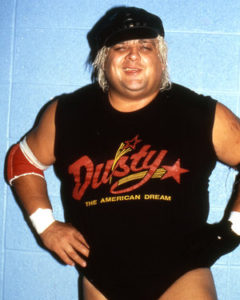
Wrestling’s herd has been thinning as of late what with a staggering number of deaths taking place in the past handful of months. Verne Gagne, Ron Wright, Steve Rickard, Tommy Rogers, Cora Combs, and Buddy Landell all moved on to the squared circle in the sky since PORK’s last issue hit the stands. However, the death that has hit me the hardest is that of none other than Dusty Rhodes. He was 69 years old.

When I first read about the Texas-born son of a plumber in The Pictorial History of Wrestling, Dusty Rhodes had already done it all in the True Sport of Kings. Seventeen years had seen Dusty wrestle and defeat legends like The Crusher, Dick the Bruiser, Cowboy Bill Watts, Harley Race, Terry Funk, and Superstar Billy Graham. He was a two-time NWA world heavyweight champion, in which the fans in jumped the guardrails to celebrate with Dusty in the ring on both occasions. Rhodes had even made an impact behind the scenes as a booker/matchmaker for the NWA’s territories in Florida and the Carolinas, in which he pioneered the concept of pro wrestling’s Super Bowl—the inaugural Starrcade in 1983. Vince McMahon saw the potential and created his own version called WrestleMania nearly two years later. One of my earliest Dusty Rhodes memories took place when the Dream returned from some injury inflicted upon him by Ric Flair and his cohorts in the Four Horsemen. Dusty proceeded to give one of the interviews of his career, speaking about the hard times he had to endure from the injury sustained. He went on to talk about various blue-collar industry workers dealing with hard times during unemployment and downsizing, which was a harsh reality for many working-class people in the Reagan era. Dusty brought it all home by promising to bring hard times into Ric Flair’s life by tearing the NWA world title from his grasp, dedicating his effort to hard-working wrestling fans all over America. I was transfixed! Hulk Hogan NEVER gave an interview like that!
Dusty spent a lot of time feuding with various members of the Four Horsemen during the mid ‘80s, providing a number of memorable moments. They would get the best of him one week and he would have a response the next. I particularly remember when the Andersons and JJ Dillon attacked Dusty with baseball bats in the Jim Crockett Promotions parking lot, which was brutal stuff for the time! Sometimes championship gold was on the line; other times, it was over the turncoat nature of the Amazonian blonde known to NWA fans as Baby Doll—the perfect 10. I was elated when the Dream upended Ric Flair for a third world title reign at the 1986 Great American Bash, but I was also unaware at the time that Dusty was not accustomed to enjoying long runs with the ten pounds of gold. That said; his victory was a victory for all of us who had to work a little bit harder to get ahead in life, just as he had promised in the aforementioned “Hard Times” promo. Small victories often count for a lot in the life of your average blue-collar American, so the fact that the Dream even managed to live up to his promise in the first place was still a big deal to me. I related to much of what Dusty would say about the American working class back then, especially being part of a blue-collar family in a place like Pittsburgh, PA during that time.
With that in mind, you might guess that I was none too happy when Dusty came aboard the WWF in 1989 and was cast as a polka dot-wearing buffoon, instead of the tough working class hero that wrestling fans had come to know and love. Time has been kind to his introductory vignettes, but I was embarrassed then to see Rhodes working in various occupations—including that of a plumber sent to fix a shit-clouded toilet. His “common man” persona was a bit over the top for me and reached condescending levels at times. Let us not forget his valet Sapphire, a brassy rotund black woman who fit the bill of the “common woman” just fine, but whose ring name was an unfortunate reference to the Sapphire Stevens character from Amos ‘n’ Andy. All of this was quite far from the scenario I would have envisioned for the man known as the American Dream. I was not a happy Dusty Rhodes fan during this time. However, I do look at those early skits with good humor now, as I should. How can you not enjoy watching Dusty working at the Americana Butcher Shop where “this here is baloney and we are full of it today”?
Dusty was often a highlight on commentary during WCW pay-per-views in the mid ‘90s. I remember a hardcore match pitting Harlem Heat against the Public Enemy, in which Rhodes completely derailed the broadcast team by erupting into uncontrollable giggles every time the wrestlers hit each other with various weapons—or “plunder,” as the Dream would say. One of my favorite moments in my wrestling fandom occurred during Chris Benoit and Kevin Sullivan’s falls-count-anywhere bout at the 1996 Great American Bash when their battle spilled into the men’s restroom. They were beating each other senseless in front of a group of fans when a lone woman shoved her way through the crowd to see what was happening. Upon sight, Dusty suddenly exclaimed, “DERE’S A LADY! DERE’S A LADY IN DA MEN’S BAFROOM! SHE STOPPED BY AND SAID ‘I GOT TO GIT SUM RELIEF!’” I had to stop typing just now because I was laughing so hard thinking about that call. I always have to rewind that part several times whenever I watch that particular match.
Many wrestling experts share the opinion that to make it big in the True Sport of Kings, it is best for a wrestler to hide their negatives and accentuate their positives. Makes sense, right? Dusty actually went in the opposite direction and was better for it! He didn’t just accentuate his negatives; he made a point to mention them whenever he could! Dusty lisped when he spoke—I did too as a little kid, at least until speech therapy corrected that issue. Perhaps that is why I responded to him so much? He wasn’t exactly in Hulk Hogan’s league when it came to cosmetics, but Dusty said it best in the “Hard Times” promo: “My belly’s just a little big and my hiney is just a little big, but brutha, I am BAD and dey KNOW I’m bad!” Dusty made you forget that he looked out of shape (unbelievably, he had a background in both football and baseball) by hanging in there with wrestling’s best and fighting hard for everything that he had. His entrance theme during the mid ‘80s was Hank Junior’s cover of Bo Diddley’s “You Can’t Judge a Book by the Cover” and I cannot think of a more appropriate song selection!
Hulk Hogan may have stormed into the arena to the tune of a song called “Real American,” but Dusty Rhodes was the American Dream. That was not just a nickname; Dusty seemed to be its living embodiment! He came from humble beginnings, supposedly climbing out of a ditch at eight years old to earn his first paycheck. Wrestling eventually became his calling, in which he overcame his limitations to build an iconic career as one of the all-time legends. That is the American Dream to me—finding what you are good at and working as hard as you can to make something of it, weathering any storms that come your way and never giving up until the day your life ceases to exist. Dusty did all of that.
I will now leave you with a wonderful Dusty Rhodes quote that I have always loved and hope that everyone with a vision for their lives and their future takes it to heart: “Get a dream…hold on to it…and SHOOT FOR THE SKY!”

